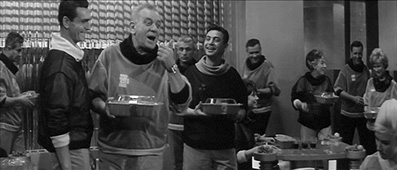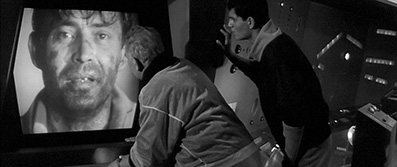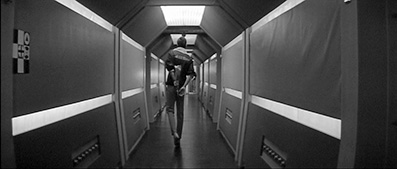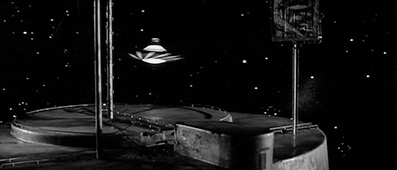|
Given the internationally pervasive nature of the Hollywood product and the sheer number of genre movies that have emerged from the US over the years, it's not surprising that we tend to regard science fiction cinema as a largely American phenomenon. This is particularly true of films involving space exploration, their international popularity mirroring the worldwide interest in America's own highly successful and much trumpeted space programme. It's all too easy to forget that the first orbiting satellite and the first man in space both hailed from the former Soviet Union. Yet it's perhaps typical of the propagandist nature of cold war politics that while American achievements in this field were celebrated in the west as daring conquests that fired the imagination, their Russian counterparts were often seen as sinister and frightening, a prejudice encapsulated by Lyndon B. Johnson's 1963 claim that "I do not think this generation of Americans is willing to go to bed each night by the light of a Communist moon." We can thus presume that this politically principled man would have refused to bed down at night or look at the sky in wonder had the Russians got to the moon before the Americans. Yet in a way, they did – despite its inelegant landing, the Russian unmanned Luna 2 was the first man-made craft to reach the moon's surface, three years before the American Ranger 4.

Yet in spite of these achievements, just about the only Russian science fiction film involving space travel that most seem to have heard of is Andrei Tarkovsky's magisterial Solaris, and even that was subjected to an inferior American remake. And I'm not trying to act all superior here – despite my fondness for space-bound adventures, I was until recently largely unaware of the science fiction cinema of the former Eastern Bloc. Then in 2011 the BFI Southbank ran a series of such films under the collective title of Kosmos: A Soviet Space Odyssey. The expected Tarkovsky double of Solaris and Stalker aside, this was a revelatory collection that included such exotic titles as the 1936 Cosmic Voyage, the 1959 The Silent Star, the 1962 Planet of Storms, and the 1924 blockbuster Aelita, Queen of Mars. But prince of these splendid rediscoveries has to be Jindřich Polák's 1963 Czechoslovakian space opera Ikarie XB 1.
Based on the novel Magellan Cloud by Solaris author Stanislaw Lem, the film is set in the year 2163 aboard a spaceship bound for the distant star of Alpha Centauri, which is orbited by planets that scientists believe are capable of supporting life. Over the course of the journey, the routine and locational restrictions of the mission see the crew's initial enthusiasm begin to wane, which all changes when they encounter what appears to be an abandoned alien ship.
In case you haven't guessed it, the title of the film is also the name of the ship, which apparently translates as Icarus XB 1, a questionable choice for a craft flying towards a distant sun. Then again, the film makes no secret of the fact that the mission is destined to take a dramatic turn, announcing it in an opening sequence that sees crew member Michal, wide-eyed with terror and brandishing a laser pistol, proclaim that the Earth has vanished and then blow away the camera on which he is being observed by his worried crewmates.

This is soon forgotten as Captain Vladimir Abajev recalls the earlier stages of the mission, and an energetic and engaging portrait unfolds of a lively and initially enthusiastic crew as they socially and professionally interact with each other and carry out their individual duties. More a small community than the traditional spaceship crew – complete with a pet dog and a woman due to give birth on the voyage – they behave much as their would if stationed on Earth, meeting for meals, going to the gym to exercise, and dancing and flirting at social events. One of the younger males even procures a sunflower from the astrobiologists with which to court a new female officer, his every move observed on CCTV by older crew members in what is effectively an on-board reality TV show. It's an intriguing social portrait that peaks at a social gathering in which future visions are interwoven with elements from the distant past, as the guests dance to sombre electronic music using steps that would not be out of place in a medieval court. This is followed by a livelier and more recognisably 60s number that plays a little like a collision between the café dance in Bande à part and a social gathering from The Prisoner.
In their gender and age mix and distinctive personalities, the crew members here have more in common with their later compatriots in Star Trek than the more militarily inclined astronauts and cosmonauts of the real world and the late 60s genre-defining film duo of 2001: A Space Odyssey and Solaris. The similarities to Star Trek don't end there. Like the starship Enterprise in all of its guises, the Ikarie is a craft of luxurious size, a "small cosmic town" able to comfortably house a crew of forty, with a sizeable gymnasium and relaxation area, a dining room and lounge, three saucer-shaped shuttle craft, a spacious and circular bridge with individual work stations and a large view screen, and enough food, fuel and other requisite supplies for a 28-month journey. There's a control deck scanner that requires its operator to look directly into a dual eyepiece that foreshadows the one operated by Spock on the Enterprise bridge, and the hand blaster with which Michal takes out that security camera looks like it was borrowed from one of the Star Trek movies. The ship even sports the sort of dual sliding doors that became such a signature feature of Roddenberry's series, although the ones here strike me as being better designed (they overlap in a way that offers better security and privacy than their Enterprise equivalent). They are also opened by passing a hand over a sensor, then speculative technology that has since come to pass. 2001 is also prefigured, in the strip-lit angular corridors, the large communication screen (a neat reveal that plays for its first few seconds like a memory) and some remarkable effects work that places actors inside or on top of convincingly designed and rendered models. That's not to say that Ikarie XB 1 doesn't do its own share of borrowing, notably from Forbidden Planet, in the off-key "electric tonalities" of the score and a robot that looks and sounds a little like a low-rent version of the iconic Robbie from Fred Wilcox's still captivating 1956 ground breaker.

Being set so far into the future, the film handily sidesteps questions about how perishable commodities such a fruit, vegetables and meat could be kept fresh over the course of so long a journey (we just assume that science has cracked that) and how the craft is able to complete a multi-billion mile journey in about eight months (ditto). Indeed, one of the remarkable aspects of the film is what it is able to convincingly communicate through visual suggestion, as with the tubes of bubbling liquid that I instantly assumed was some sort of oxygen recycling system, or the gravity boots whose function is revealed not through expositional dialogue, but the way the soles light up when they make contact with a metal floor. Quite how this effect was achieved is anybody's guess – nowadays you'd probably use of small, remotely controlled LED lights, not something you could pick up at Radio Shack back in 1963.
So brisk is the pace and busy the surface detail that the gradual effects of apathy and cabin fever seem to kick in before you realise they were even coming, realised in moments of seemingly minor significance: the piano lesson that stalls midway when the teacher wanders off after complaining that something needs to happen; the gym that after four months no longer attracts the same number of visitors it once did; Michal's disproportionately explosive response his colleague's incessant chatter. But it's when the earlier detailed social gathering is disrupted by a ship-wide alert that the film starts to move into potentially darker territory, as two crew members are dispatched to explore a stalled craft whose contents I'm not about to reveal here, a ship boarding scene as tense and chilling as any I've seen since I first sat down for Alien in 1979, which Ikarie predates by sixteen years. From this point on, an air of potential disaster hangs over the ship, confirmed when crew members Michal and Erik step outside to install the reserve engine, a routine procedure that, according to the Captain, "was the beginning of a grave danger for all of us."

Although played by Czech actors speaking the Czech language, the Ikarie was clearly intended to be seen as an international endeavour. This is, after all, not a Czech national mission but one launched by the 'World Astronautical and Space Centre', one whose crew includes distinctly non-Czech sounding names like MacDonald, Marcel Bernard, Erik Svenson and Anthony Hopkins (oh yes). A pro-communist political subtext has been read into the film (and was cut from the heavily reworked American version, titled Voyage to the End of the Universe), but the message is actually a science fiction standard, with the citizens of a utopian future society shaking their heads in sorry disbelief at the warlike nature of their barbaric ancestors. More power to them. Did I mention that the film was an influence on Star Trek?
Ikarie XB 1 is a genuinely remarkable achievement on a number of fronts. Its production design, model work and special effects are extraordinary for their day, its characters engaging and quickly defined, its science, when discussed, theoretically sound (the result, no doubt, of having six scientific advisers) and its technology forward-looking and intermittently prophetic. It also makes for a gripping, entertaining and character-driven drama that moves at a pace that will occasionally leave the inattentive struggling to catch up. And despite that opening pointer towards things to come, it rarely signposts where it's heading next – just three minutes from the end I could not work out how it could possibly conclude in anything approaching a satisfactory manner. Yet that's just what it did, and without feeling rushed or short-changing its audience.
Framed in its original scope 2.35:1 ratio and anamorphically enhanced, this is a tonally pleasing and impressively detailed monochrome transfer that is well up to the usual and expected Second Run standard. Ikarie XB 1 is not the visually brightest of films and some detail is pulled into the darker areas of a couple of scenes, but there is a sense that this was the intended look – on brighter sequences the contrast range is generally spot on, and the ship boarding scene, where the dark interior is illuminated largely by the astronauts' torches, is splendidly rendered. As you would hope for any film set in space, the black levels are solid.

Unsurprisingly, the Dolby 2.0 mono soundtrack has a more limited dynamic range than you'd find on a modern film, but it's a lot clearer than you might expect for a work of early 60s vintage and you'll have to really crank up the volume to hear a trace of background hiss.
An Appreciation by Kim Newman (11:31)
The venerable Mr. Newman offers a typically engaging appreciation of the film, including useful background detail on the socio-political conditions under which it was made and it's influence on later works, plus a breakdown of the cuts and alterations made for the original American version.
Also included is a Booklet containing an excellent essay by Michael Brooke that provides detailed information on the development of Eastern Bloc science fiction cinema, the release of the film, the changes made by American International (and Francis Ford Coppola!) for the US release, and its influence on later western genre works. It was, however, a little disconcerting to find so many of the points that I'd made in my review being so concisely highlighted by Mr. Brooke. That's my story and I'm sticking to it.
Although considerably less well known than the films and TV shows that it helped to shape and inspire, Ikarie XB 1 deserves to be held in similarly high regard and as widely seen and appreciated. Second Run never fail to deliver the goods, but Ikarie XB 1 was so up my street that it felt like an early and welcome birthday present. Highly recommended.
|